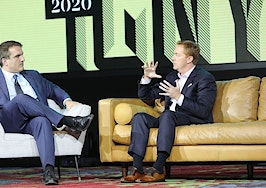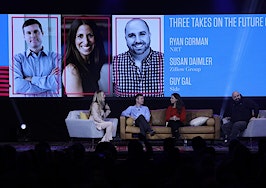When Guy Gal moved into real estate from the tech world about three years ago, he decided to have opinions: His brokerage Side would vet the various technologies agents can use — so, things like customer relationship managers (CRMs) — and then make a call on which systems are actually worthwhile.
“We know how to evaluate a product and know if it’s going to deliver,” Gal told an audience of real estate professionals at Inman Connect New York Wednesday. “We’ll actually take a position and say this is the best CRM.”
The comments prompted something of a debate Wednesday afternoon over what role a brokerage actually has in choosing agents’ technology. On the one had, Gal argued that real estate professionals have a massive amount of things to do and vetting various new technology products is not a good use of time. And if agents do wade into the tech environment, they may be overwhelmed.
“If you’re an agent you will die from indigestion before starvation,” he continued, comparing tech consumption to food.

Side CEO Guy Gal Wednesday at Inman Connect New York. Credit: AJ Canaria of PlanOmatic / Inside Real Estate
Gal also said that his experience thus far supports this philosophy.
“It’s perceived as a service,” Gal said of Side’s practice of actively choosing tech products. “And it is. It’s actually been welcomed.”
But not everyone agreed.
Dave Gordon, chief technology officer of Realogy, said that his company’s approach involves offering high-quality products, but also fostering an environment of freedom in which real estate professionals on the ground choose their own tools. The reason for this, he said, is that the best product is always changing — something he described as a “leapfrog effect” — and because what’s good for one broker isn’t good for everyone.
“You can’t pick the best one,” Gordon argued.

Dave Gordon, chief technology officer of Realogy, Wednesday at Inman Connect. Credit: AJ Canaria of PlanOmatic / Inside Real Estate
Marnie Blanco — a vice president of industry relations at Zillow Group-owned transaction management platform Dotloop — largely agreed, saying that trying to get everyone on the same tech platform is “like herding cats.”
Gal, Gordon and Blanco all spoke during a panel at Inman Connect, dubbed “The Quest for the Holy Grail,” about real estate technology.
Blanco also struck a middle ground between Gal and Gordon, arguing that brokerages can make recommendations while also allowing for freedom. And indeed both Side and Realogy do foreground certain tech while ultimately letting agents and brokers make their own final choices — meaning that in practice, they’re not necessarily so far apart.
But Blanco said that the real question when it comes to technology boils down to something very simple: “Does it save the agent time, and does it make them money?”

Marnie Blanco Wednesday at Inman Connect New York. Credit: AJ Canaria of PlanOmatic / Inside Real Estate
Gal and Gordon both ultimately agreed that they have some common ground. And they conceded that their different approaches may also have to do with the vastly different scopes of their respective businesses. Side is just a few years old and, Gal said Wednesday, right now works only with agents who are doing at least $20 million in volume per year. Realogy on the other hand is old, massive and has nearly 200,000 agents under its various banners.
“I think when you’re serving hundreds of thousands of agents you can’t really approach that in a way where one size fits all,” Gal said. “But we’re going to be a responsible partner and tell them what’s best based on a lot of work.”
Gordon offered a similar strategy.
“We believe we’re just going to try to offer great products,” Gordon added.













